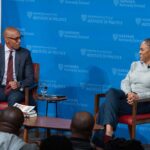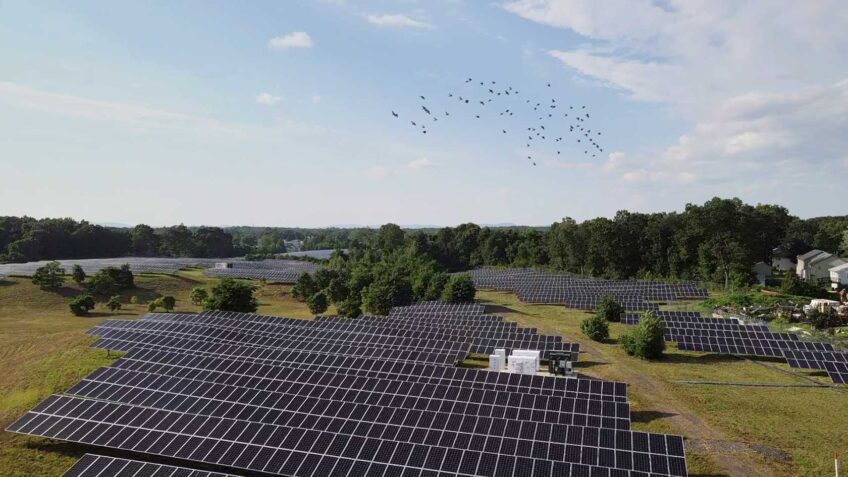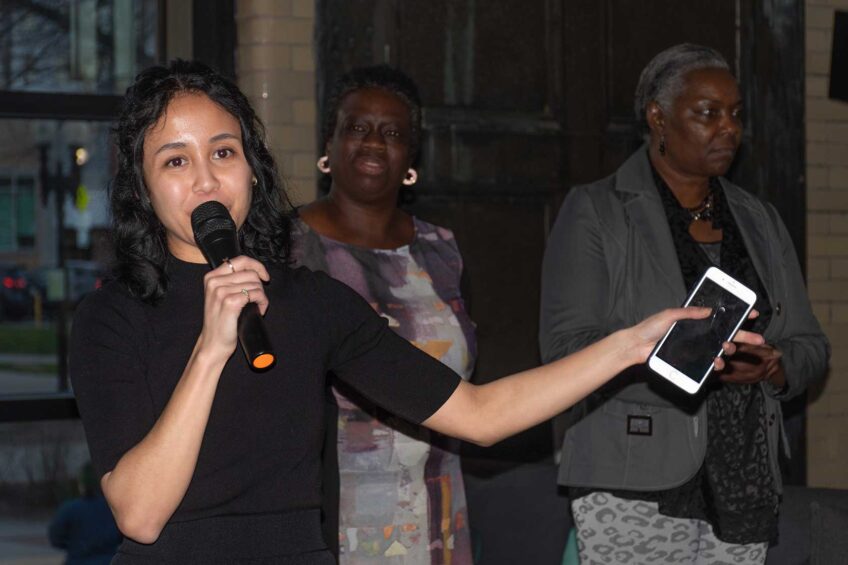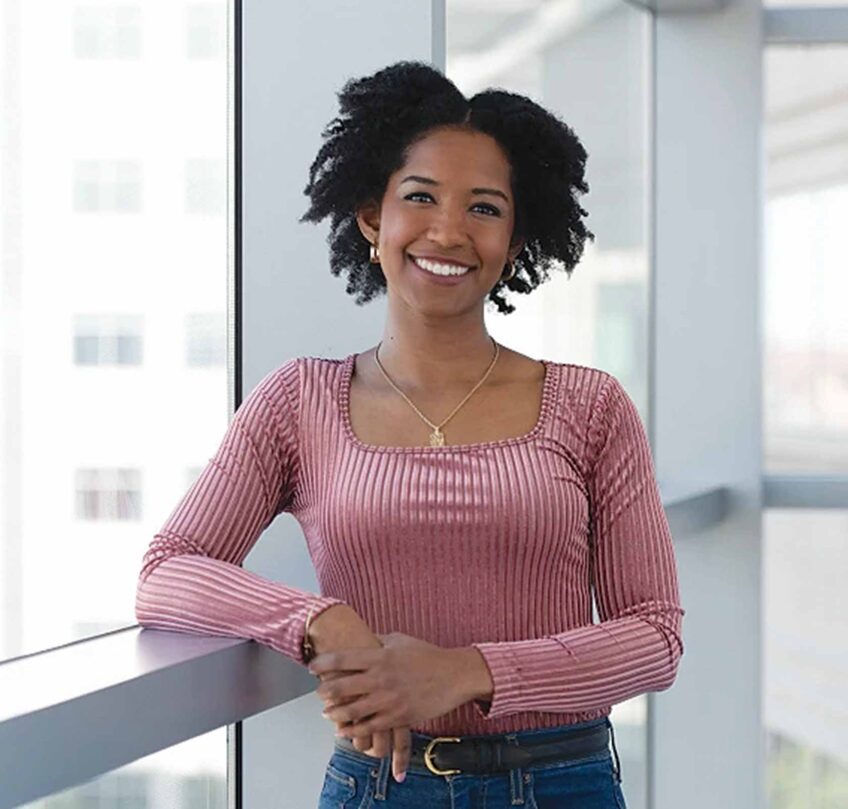Activists demand halt to state reopening plan
Groups stage black, Latino COVID victim memorial
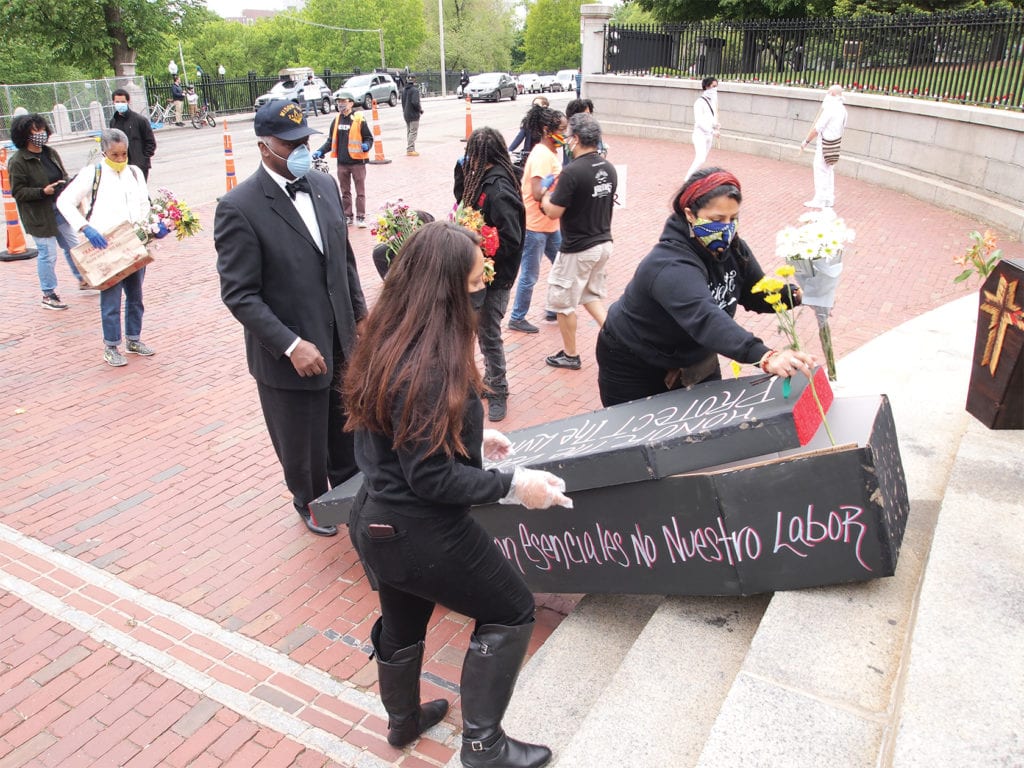
Black and Latinx advocates used Memorial Day to commemorate the people of color who have died from COVID-19 and demand a rollback of the state’s reopening plans.
Members of the social justice group Mijente organized a protest that ended on the steps of the Massachusetts State House Monday. Representatives of 50 other advocacy groups joined the crowd and urged Gov. Charlie Baker to reconsider reopening procedures.

Priscilla Flint-Banks addresses a gathering in protest of the state reopening plan. Photo: Lauren Miller
“We are out here to honor those black and Latinx lives lost to COVID-19 in Boston and across Massachusetts, and to bring attention to those who had a seat on the task force to reopen the Massachusetts economy,” said Mijente organizer Vero Navarro. “That was a group more concerned for profit than the suffering of black and brown people.”
The groups’ demands included the creation of a community board to weigh in on how to reopen safely. Baker’s current reopening board has 13 CEOs and no front-line essential workers, Mijente activists point out.
“Our governor is asking the black and Latino workers to sacrifice themselves for the economy,” said Al Vega, a member of the Massachusetts Coalition for Occupational Safety and Health. “We are here to honor the dead but fight like hell for the living.”
The protest began at Davio’s steakhouse on Berkeley Street. The restaurant’s chief executive, Steve DiFillippo, currently serves on Baker’s reopening board.
Mijente released a report last month detailing the impact of COVID-19 on Latinos. The report projects that “it will take Latinos a decade at minimum to recover from the effects of this pandemic.” It also notes that Latinos are dying at high rates due to poverty, a lack of health care and a concentration in “high risk” or front-line jobs.
Navarro noted that Latinx people are 17% of the state’s workforce, but they make up 55% of custodial workers. Many of these workers will be returning to work in phase 1 of the governor’s reopening plan.
“When we’re talking about phase 1, it’s not asking affluent people who have the privilege to work from home to go back to work,” Navarro said, noting that many people in white-collar firms will be working from home through the rest of the year.
The Pew Research Center has also reported that Latinos are disproportionately affected by the COVID-19 pandemic. About 40% of Latinos had to take a pay cut, compared to 27% of all Americans. Nearly 30% have lost their jobs, compared to 20% of the overall population.
The data may even be incomplete.
“We’re not tracking data closely enough to even know how bad the disparity is,” said Armani White, an organizer from the Black Boston COVID-19 Coalition.
The Baker administration records deaths by race, along with other variables such as sex and age group. As of Monday, however, the state’s race data was unknown for over 41% of cases and 42% of deaths.
Case data shows that the “Hispanic” group makes up 17.9% of Massachusetts’ cases, and “Non-Hispanic Black/African American” makes up 8.8% of cases statewide. There have been 93,271 total known cases in the state as of Monday.
Boston has recorded race data for 10,212 of the city’s 12,466 cases. The “Black/African American” group accounted for 38% of the cases, but recent estimates note that black individuals make up only 25% of the city’s population. The “Latinx/Hispanic” group accounted for 25% of cases, but Latino residents make up about 20% of the city’s population. On the other hand, white people make up about 45% of the city’s population, but only about 25% of race-recorded cases.
As part of Monday’s protest, an empty seat was placed in front of Davio’s. It was painted with the words “Essential workers have no seat at the table.” Advocates urged Baker to consult community advocates before fully reopening. Baker has defended the reopening board’s composition in the past, noting that it would be difficult to have members representing “every single point of view that’s out there.”
Along with the community board, advocates also demanded an end to ICE surveillance; decarceration; housing stability during and after the crisis; no budget cuts to healthcare or education; emergency sick time and hazard pay for essential workers; and guaranteed income, healthcare, food and transportation for all.
The protestors traveled from Davio’s to the State House steps in a mock funeral procession, and later laid flowers on a mock casket in memory of late loved ones.
Baker recently announced his four-phase reopening plan. Each business must follow industry-specific guidelines to ensure safety standards are met. The plan allows for offices to reopen at 25% capacity. Mayor Marty Walsh, however, expressed hesitation: he doesn’t think there will be 25% capacity in any office in the city when they reopen June 1. Walsh also said that he supports limiting capacity on public transit and increasing transit service.
State Rep. Mike Connolly, who represents parts of Somerville and Cambridge, said in a Zoom call hosted by Mijente that the reopening process is “unscientific” and “uninformed.”
“I know it’s easy for all of us to point the finger at the occupant of the White House and point out how he ignores science and ignores the experts,” he said. “But the truth is, we have seen in our own commonwealth a rejection of science and a rejection of experts.”
Connolly noted that while planning reopening, Massachusetts hadn’t even satisfied the World Health Organization (WHO) benchmarks in terms of testing standards. Connolly also said that the state doesn’t offer drivers licenses for undocumented immigrants, which may hinder case counts, as many COVID-19 test sites are drive-thru.
He added that if Massachusetts were counted as its own separate country, it would rank 11th out of over 200 other countries, as one of the worst outbreaks in the entire world.
Connolly said that the administration has come to a crossroads: officials must decide between reallocating resources to preserve human lives or making a “human sacrifice” for the sake of the economy. Many have rejected science to “serve capitalism,” he said.
“We need to focus on those who have been most impacted,” he said, adding, “Just because you’re undocumented, or just because you’re incarcerated, you’re not subject to a death sentence.”

![Banner [Virtual] Art Gallery](https://baystatebanner.com/wp-content/uploads/2024/05/Breathe-Life-4-ToGetHe_WM-150x150.jpg)
